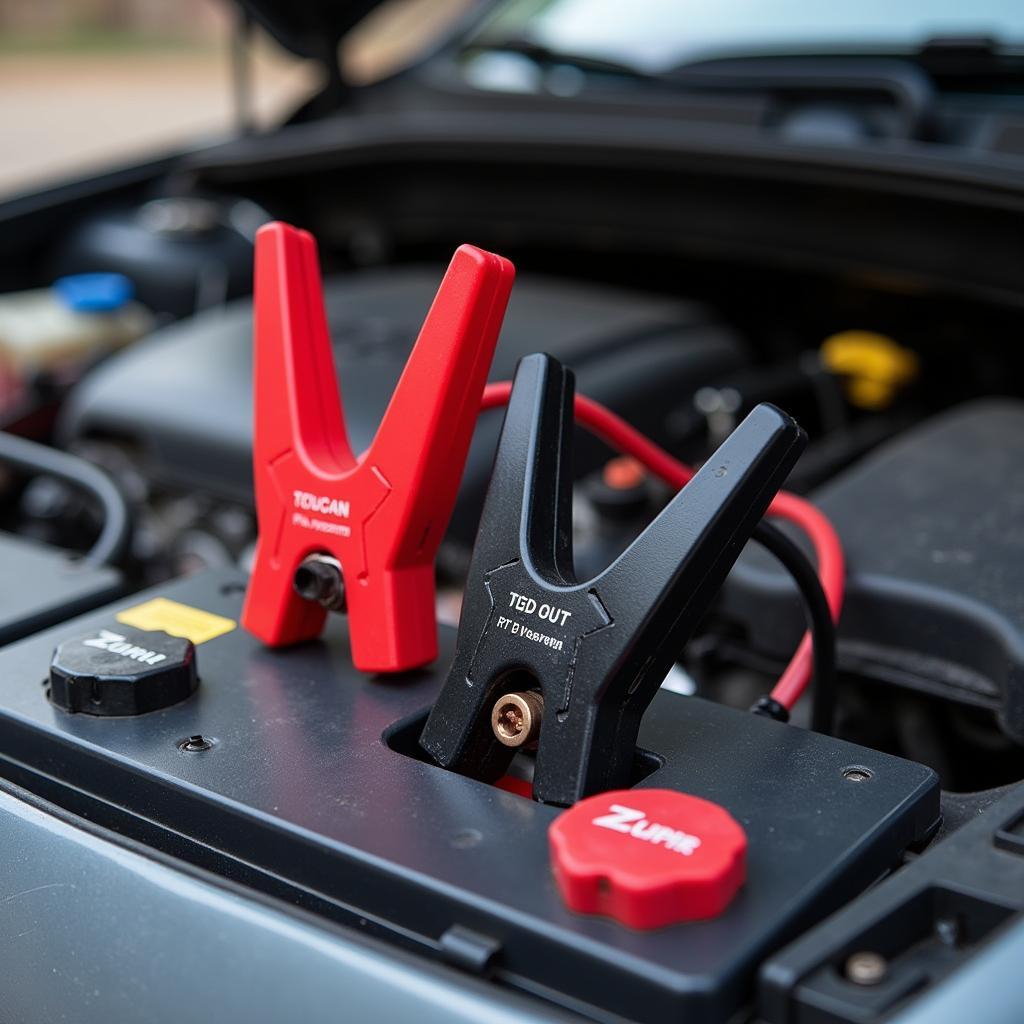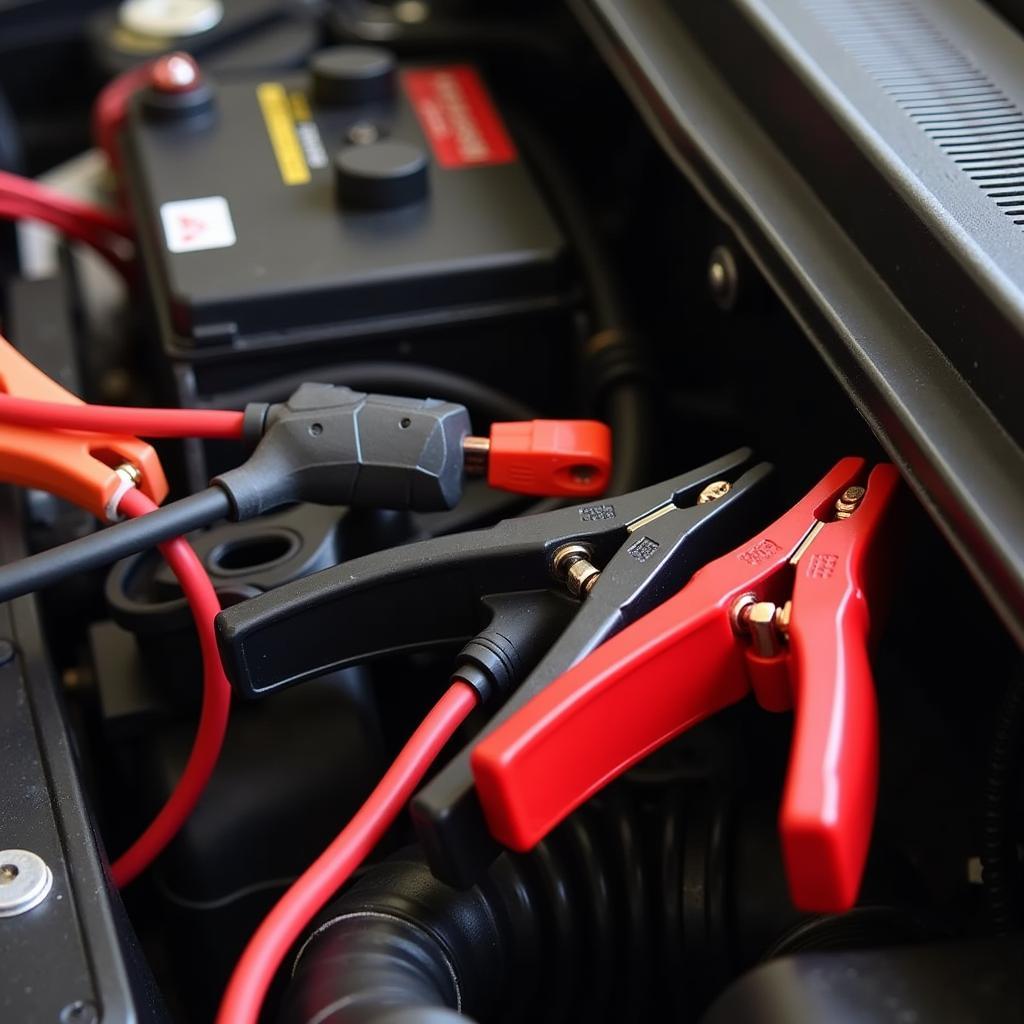A dead battery is the most common reason a low battery car won’t start. This can be incredibly frustrating, especially when you’re in a hurry. But don’t panic! This guide will provide you with the expertise to diagnose, troubleshoot, and even fix the problem yourself. We’ll explore the reasons why your car battery might be low, how to test it, and what steps you can take to get back on the road. Let’s dive in!
 Car Won't Start: Jump Starting a Car with Low Battery
Car Won't Start: Jump Starting a Car with Low Battery
Why Your Car Battery Might Be Low
Several factors can contribute to a low car battery, ranging from simple oversights to more complex electrical issues. Let’s examine some of the most common culprits.
Common Causes of a Low Car Battery
- Lights Left On: Accidentally leaving your headlights, interior lights, or even the glove box light on can drain your battery overnight. This is a surprisingly common occurrence and an easy fix.
- Extreme Temperatures: Both extreme heat and extreme cold can affect your battery’s performance. Heat can evaporate the battery fluid, while cold can slow down the chemical reactions necessary for power generation.
- Old Age: Like any component, car batteries have a limited lifespan. Typically, they last between three and five years. As your battery ages, its ability to hold a charge diminishes.
- Parasitic Drain: Even when your car is off, certain systems continue to draw small amounts of power. This is known as parasitic drain. A faulty component or wiring issue can cause excessive drain, leading to a low battery.
- Alternator Issues: The alternator is responsible for recharging the battery while the engine is running. A malfunctioning alternator won’t charge the battery properly, eventually leading to a dead battery.
- Short Trips: Continuously taking short trips without allowing enough time for the alternator to fully recharge the battery can also contribute to a low charge.
Troubleshooting a Low Car Battery
If your car won’t start low battery, the first step is to confirm that the battery is indeed the problem. Here’s how you can do it:
Testing Your Car Battery
- Visual Inspection: Check the battery terminals for corrosion. White, powdery residue indicates corrosion, which can hinder the flow of electricity.
- Voltage Test: Use a multimeter to measure the battery voltage. A healthy battery should read around 12.6 volts. A reading significantly lower than this indicates a low battery. If you experience problems after replacing car battery, check the voltage to make sure the new battery is working correctly.
- Load Test: A load test measures the battery’s ability to hold a charge under load. This is a more thorough test and can be performed at most auto parts stores.
Solutions for a Low Car Battery
Once you’ve confirmed that the battery is the culprit, you have several options to get your car started:
Jump Starting Your Car
Jump-starting your car is a common and effective solution. However, it’s crucial to follow the correct procedure to avoid damage. For a comprehensive guide on jump-starting, check out our article on [problems with jump starting a car](https://cardiagtech.shop/problems-with-jump-starting-a car/).
Charging Your Car Battery
If your car battery is discharging very fast, you may need to charge it using a battery charger. This is a more time-consuming solution but can be beneficial for deeply discharged batteries. You can find detailed information on battery discharge issues in our article: car battery discharging very fast.
Replacing Your Car Battery
If your battery is old or has sustained significant damage, replacement is often the best course of action. After replacing the battery, you might encounter unforeseen issues, so it’s a good idea to read our guide on problems after replacing car battery.
Expert Insights
- John Smith, Automotive Electrical Engineer: “Regular battery maintenance, like cleaning the terminals and checking the voltage, can significantly extend the life of your battery.”
- Jane Doe, Certified Automotive Technician: “If your battery keeps dying overnight, it’s essential to check for parasitic drain. Our article on battery dead overnight can help you pinpoint the cause.”
Conclusion
A low battery car won’t start can be a significant inconvenience, but with the right knowledge and tools, you can diagnose and address the problem effectively. By understanding the causes of a low battery and following the troubleshooting steps outlined in this guide, you can get back on the road quickly and safely. Don’t forget to check out our comprehensive guide on car won t start low battery for further assistance.


